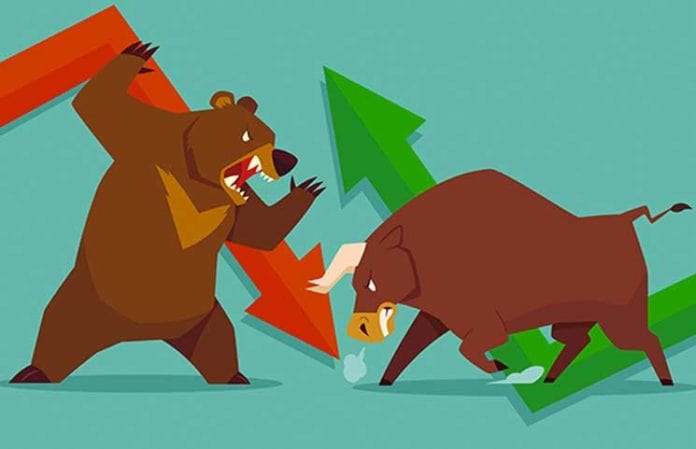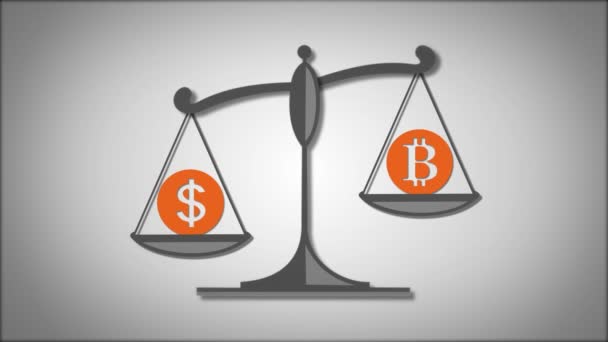Studies of historical stock market corrections, both minor and major crashes, tell us that when the market does not correct every 4-6 years, the eventual crash is usually devastating. And the last major crash was in 2007-2009. And, we know that other asset classes react when the stock market corrects.
Now, we have cryptocurrencies as a new asset class. It, too, should react to stock market fluctuations. But how? We dont have enough history on cryptos to tell us, so we must rely on our crystal ball. Lets see if we can predict what will happen to cryptocurrencies when we see a stock market crash?
Would a new major crash in the stock market send Bitcoin to new heights or drag it down with it? Actually, there are a couple of different opinions on this:
- Bitcoin and the stock market are correlated
- Investors see crypto as high risk or low-risk investment
Ultimately, the correct answer is nobody actually knows, because a cryptocurrency has only ever existed during a bull market for Wall Street. Seeing as that may be changing with the stock market beginning to show signs of a downturn, we may soon find out exactly how this unfolds.
Many individuals in crypto are of the mentality that Bitcoin and crypto is a hedge against society, inflation, and US Stocks. Also, Bitcoin is often referred to as digital gold and a store of value in the time of crisis and uncertainty. Therefore, Bitcoin would thrive in a US Market crash. However, Bitcoin has never been put to this test before. It emerged out of the ruble of the 2008 crisis and has existed alongside a thriving US Stock Market for the past 9 years. But if a crash/correction occurs within the next 12 to 14 months, investors will likely embrace tactics of risk aversion. This includes investing in stable commodities and precious metals such as gold and silver. After the 2008 financial crisis, the value of gold more than doubled from 2009 to 2011.
If Bitcoin was directly or inversely proportional to the stock market, it would mean that when stocks made a move, Bitcoin would move opposite or parallel in a similar time-frame. While there have been some correlative moments, most analysts do not believe the two to be directly moving in sync with each other. In a recent interview with CNBC, Anthony Pompliano argues that there just isnt any real data showing a correlation, though there may well be a psychological connection. That is to say, when investors get scared, they may pull money out of both, and when they get excited, they may put money into both.
Stock Market Today
Currently, the US Stock Market is in one of the most prosperous bull markets ever seen. Some commentators enthusiastically claim we are experiencing the longest and strongest economic expansion in the history of the Stock Market.
According to the standard definition given by the Wall Street Journal, a movement of 20% or more in either direction defines a market condition being either bullish or bearish. According to this metric, the current bull run has been the longest in history.
- Bearish Market
The bears have it that a crash in the global economy will bring about a crash in cryptocurrency markets. Anyone holding crypto will automatically try to cash-out of the market in an attempt to liquidate their holdings into usable cash currency. Effectively crashing the crypto markets down to nothing in the rush to sell crypto-holdings at the highest possible price.
- Bullish Market
The bulls believe that after the first sell-off and the initial effects of the crash begin to settle there will be a sudden wave of people ‘buying the dip’ and crypto will regain value.
The genesis of Bitcoin and the blockchain happened in the midst of the last crisis, but it was subversive and only of particular interest to the tech-savvy. Now, that has changed, and most of the world knows about Bitcoin, and its offshoots. However, whether cryptocurrency attains any level of mainstream adoption is debatable.

When a major working class decides to invest in a certain asset class, it usually goes up. This will be even more so when it becomes an alternative during the time of crisis. More and more millennials are placing their trust in Bitcoin over gold or Government, and this trend is expected to continue. That is a bullish sign for the future of Bitcoin in particular and crypto space in general.
Digital Gold as A Safe Low-Risk Alternative
Whenever Equity market crashes, people flee their investments into other asset classes and gold used to be the first stop for such diversification. This inverse relationship has been a known fact for the stock market veterans and they usually liquidate their stocks into gold whenever the market reaches its peak. While providing a safe haven for the investments – it is notoriously difficult to spend gold in the time of need.
Often you hear the term “digital gold,” when referring to Bitcoin, and there are some reasons to see parallels. Bitcoin has an advantage over gold in this aspect. It can be used as currency. It is relatively easy to liquidate to Bitcoin into Fiat these days and in some location – there is no need to convert either.
More and more countries (e.g. Zimbabwe, Argentina, Venezuela) are becoming victims of high inflation, where the failure of fiat pushed Bitcoin prices over the roof. Next crash is expected to happen because of global inflation and if that happens, there is a good chance that other countries will join hands in pushing the fiat value of Bitcoin:
- Inflation creates high demand for cryptocurrency
- Physical Bitcoin custodial services will make Bitcoin even more scarce
- Millennials are a major part of the workforce and they are demanding Bitcoin
- Bitcoin is emerging to be a better alternative to Gold as a hedge against stock market
- Bitcoin wallets grew from 3 Million in 2015 to 28 million in 2018 and are growing every day
- Coinbase CEO expects a number of crypto users will grow to Billion from its current 40 million
Bitcoin as a High-Risk Alternative
On the other hand, there are also negative factors working against Bitcoin in case of an economic meltdown:
- Fear of the unknown
Lots of people entrust Government as their caretaker in case of crisis. The economic meltdown is a crisis that everyone blames on government and look for the same government to save us all from.
- Masses matter
Crypto market is a minority when compared to the rest of the financial markets. Lots of people don’t even know about Bitcoin and altcoin, except as a news item. It is estimated that only 40 million wallets exist in the world. 40 Million doesn’t even account for a full percentage in terms of the global population, while 69% of the world’s adult population has access to a bank account, according to the Global Financial Inclusion report.
When an economic crisis comes, people will flock their money into things they are aware of, like Gold, Silver, more stocks at bargain prices, physical fiat, goods, etc. They won’t venture into a new asset class that they don’t know what to do with.
- Mass panic
If media were to side with traditional stock markets and fiat agencies – it is very easy to create panic and scare people from crypto into whatever their rhetoric may be.
Would Bitcoin Thrive or Burn in A US Stock Market Crash?
In the short term, it is very difficult to say if the bitcoin market crash. If a US Stock Market falls down, and the effects were worse than in 2008, that event would further instill negative sentiment millennials have about banks. Millennials already witnessed many of their parents lose millions in the crash of 2008 if a similar event were to occur, their confidence in banking and the financial sector would further disintegrate.
As it was mentioned above, buying Bitcoin has been a favorable investment for millennials as opposed to owning traditional stocks. This could ultimately push their generation toward a global financial world centered around a blockchain ledger. The short term impact of a US recession on the price of Bitcoin is uncertain, or at the very least highly speculative. But long term, another great recession could shape the minds of an entire generation, thus pushing them toward cryptocurrencies and decentralized systems, ultimately leading to the greatest currency shift in the history of civilization.
Summing Up
There are opposing theories on what will happen to the cryptocurrency markets in the face of another global market crash. On one side there are the bulls, the Bitcoin holders and traders that think that the next economic crash will make cryptocurrencies thrive. On the other side, there are the bears, the pessimists who believe that the financial crisis will cause the devastation of the crypto world.
It is possible that both could happen depending on when the crash occurs and how far Bitcoin (and other altcoins) has been adopted into mainstream usage.


